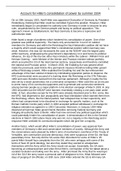1
Account for Hitler's consolidation of power by summer 1934
On on 30th January 1933, Adolf Hitler was appointed Chancellor of Germany by President
Hindenburg, thinking that Hitler could be controlled if given this position. However, Hitler
immediately began to consolidate his authority over Germany in order to become its only
ruler, unquestioned by the German people and facing no political opposition. This
approach, known as totalitarianism, led Nazi Germany to become a repressive and
authoritarian state.
Hitler faced a range of problems which hindered his consolidation of power. One of the
greatest was political superiority. The Nazis only accounted for 3 out of 12 cabinet
members for Germany and within the Reichstag the Nazi-Nationalist coalition did not have
a majority which would suggest that Hitler’s constitutional position within Germany was
weak. However, this was not necessarily the case as the NSDAP was the largest party
within Germany, emphasising the government’s dependency on it and hence its political
influence. On top of this the two other Nazi ministers within the cabinet - Wilhelm Frick and
Herman Goering - were Minister of the Interior and Prussian minister without portfolio,
which accounted for 2/3 of the total German territory, respectively and therefore controlled
the national and Prussian police. In March 1933, the Enabling Act was passed which
made the previously used Article 48 a permanent measure therefore letting Hitler govern
without Reichstag consent. Hitler exploited the Enabling Act and the law enforcement
advantage of the Nazi cabinet ministers by intimidating opposition parties to disperse: the
KPD (communists) were accused of a burning down the Reichstag on the 27th February
1933 and were therefore banned from the German parliament. Although in reality the fire
was set by a dutch pyromaniac not a communist conspirator, Hitler used this as an excuse
to arrest many of his communist opponents and to generate anti-communist sentiment
among German people as a major platform in his election campaign of March 1933. In July
1933 all parties but the NSDAP were banned, essentially creating a one party state under
Hitler. In fact, all parties except for the SPD were already dissolved prior to this: some, like
the KPD, had dispersed to due unpopularity and Nazi intimidation which banned them from
the Reichstag, others, like the liberal parties, had collapsed due to Nazi superiority, and
others had compromised to be dissolved in exchange for specific matters, such at the
Roman Catholic Centre party which in 1933 accepted political withdrawal in exchange for
religious toleration as agreed in a 1933 Concordat. Moreover, in January 1934 Hitler
dissolved all German State governments therefore removing Federal Germany and
bringing all authority back to Berlin. Hitler had now removed any political opposition which
could potentially hinder his consolidation of power. A demonstration of this is the General
elections in March 1933 where Nazis only won 44, not a majority in the Reichstag and in
response Hitler arrested 81 communist deputies which did give him a majority.
Another factor, which would affect Hitler’s consolidation of power, was approval from
members of Germany’s elite and conservative members of society. Although the Army and
the conservatives were pleased by Hitler’s aims of rearmament, overthrow of the Treaty of
Versailles, anti communism and anti democracy, they were suspicious of the SA, the Nazi
paramilitary force. Not only did the SA evoke their discontent for some of Hitler’s ’25
points’Hitler himself face complaints from the SA, who were unhappy with some of the
terms of Nazi 25 point ideology, but also they stated they wanted to amalgamate
themselves with the Army which the Army would not accept. Essentially, the SA were
becoming an embarrassment and when Ernst Rohm, commander of the SA talked about a
socialist revolution and taking over the army , Hitler promised the Army that he would get
rid of the SA if the army swore a personal oath of allegiance to him. What followed were
days of purging of SA officials; on 30th June 1934 Hitler ordered the SS to kill many SA





